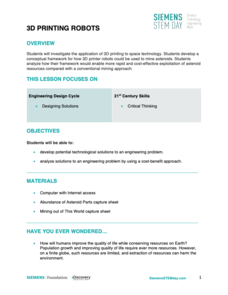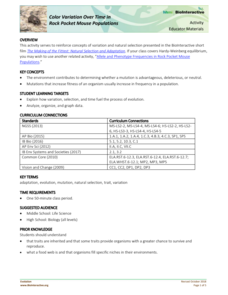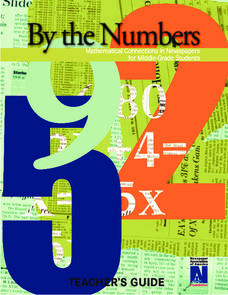Corbett Maths
Construct a 30 Degree Angle
Split it down the middle. Using the tools of geometric construction, the video shows two different methods of constructing a 30-degree angle. The first method bisects an angle of an equilateral triangle. The second uses the diagonal of a...
Ziptales
The Pied Piper of Hamelin: The Mystery of the Children of Hamelin
Which is more likely: 130 children followed a magical piper out of Hamelin and disappeared forever, or that they died of the plague? Or could they have escaped from Hamelin via a secret tunnel to Transylvania? Learners investigate...
Serendip
From Gene to Protein via Transcription and Translation
DNA carries the codes for creating just the right protein. A well-designed lesson leads pupils through the process from start to finish and everywhere in between. Guiding questions with supporting video help scholars understand the...
PBS
Math with Jake: Ratios and Fractions
And the beat goes on. The installment of the Math at the Core: Ratios series introduces time signatures in music. A musician shows the relationship between different types of musical beats. Working in pairs, classmates create beat...
Meadows Center for Preventing Educational Risk, University of Texas at Austin
Lesson 12 - Ed Suffix with Unchanging Base Words
Understanding different verb tenses begins with knowing how to decode words. A lesson on the -ed suffix with unchanging base words introduces readers to the past tense. Teachers present the skill with oral reading and spelling...
Corbett Maths
Algebraic Proof
Proofs do not exist only in geometry. The video shows the class different ways that proofs appear in algebra. Pupils work through a variety of algebraic proofs involving the divisibility of an algebraic expression or whether it is even...
Howard Hughes Medical Institute
Determining the Size and Energy of the K-T Asteroid
Two different groups of scientists published scientific papers in 1980 offering proof of a large asteroid hitting Earth between the Cretaceous and Tertiary layers of ground. Scholars use a worksheet to analyze the same type of data as...
Howard Hughes Medical Institute
Beaks as Tools: Selective Advantage in Changing Environments
How does nature select some adaptations over others? Scholars experiment picking up seeds with two different types of tools simulating beaks. After practicing, they experience a drought where one type of seed suddenly isn't available....
PreKinders
Insect Picture Word Cards
Creepy crawly insects! Learn the names of 12 different insects, including ladybugs, cicadas, and katydids. Each card features a picture of the insect as well as its name in large letters.
Howard Hughes Medical Institute
Natural Selection and Evolution of Rock Pocket Mouse Populations
Can evolution repeat itself? Scholars analyze amino acid data in two separate populations of mice. They learn that evolution repeats itself, but natural selection prefers some mutations over others in different environments. Analysis...
California Department of Education
Tension and Release: Creating Mindful Harmony (CTE)
Perhaps the Doobie Brothers said it best when they sang, "Listen to the Music." With the third of four lessons from the Changing One's Tune: A Music Therapy STEM Integrated Project series, pupils discover the connection between music and...
Ford's Theatre
Socratic Seminar/Group Discussion: The Crisis of the Civil War
High schoolers work in four different groups to examine the many factors that led to the American Civil War. They research an assigned topic, prepare questions, and finally engage in a class discussion using the Socratic Seminar method.
Discovery Education
3D Printing Robots
What is water worth to you? The answer probably depends on many different variables. Learners explore the value of water in space and what it takes to transport the resource to locations in a galaxy far far away. They then consider...
Howard Hughes Medical Institute
Color Variation Over Time in Rock Pocket Mouse Populations
Simple characteristic changes can have a significant impact on species survival. A hands-on activity has learners investigate the color variation in pocket mouse populations in different environments. They connect the timing and number...
CK-12 Foundation
Integers that Represent Different Situations: Football Field
A football-themed interactive focuses on integers. Seven questions challenge scholars to show what they know by way of short answers, multiple-choice, and true or false. An open-ended question followed by a discussion concludes the...
Science Matters
You Gotta Have Heart
Here's a lesson that's not for the faint of heart! The seventh activity in a larger series introduces learners to the circulatory system with a study of the heart anatomy. Using a pig heart, individuals identify the different components...
Science Matters
Hierarchy
A system is only as good as the sum of its parts! Young scholars explore the components of the different body systems using a hands-on lesson. The lesson helps learners build an understanding that there is a hierarchy of components in...
University of Richmond
Canals 1820-1860
While canals are not a common mode of transportation today, they were part of the fuel for America's industrialization. However, most of them were located in the North, also feeding regional differences and sectionalism. Using an...
Pace University
Grades 6-8 Ecology
Why are our national parks important? Scholars research the national parks and explore the basic ecology of these areas in a differentiated instruction unit on ecology. They learn about ecosystems, food chains, symbiosis, and biomes. The...
Newspaper Association of America
By the Numbers: Mathematical Connections in Newspapers for Middle-Grade Students
A cross-curricular resource teaches and reinforces mathematical concepts with several activities that use parts of a newspaper. Scholars use scavenger hunts to find the different ways math is used in the paper along with using data...
Discovery Education
By All Indications
How do people determine if something is acidic or basic? Learners make their own acid-base indicators using red cabbage and then determine the acidity and alkalinity of different substances. First, they test substances of known pH and...
NOAA
How Do We Know?: Make Additional Weather Sensors; Set Up a Home Weather Station
Viewers learn about three different weather measurement tools in installment five of the 10-part Discover Your Changing World series. They build weather vanes to collect data on wind speed, barometers to determine air pressure, and rain...
Purdue University
Animal Diversity and Tracking
What exactly are those glowing eyes in the night? Learners run an experiment to attract local wildlife and then document the number of visitors by identifying their tracks. They then analyze the data to draw conclusions about the types...
Purdue University
What a Waste of Food!
Follow the life of an apple from harvest to the consumer. A three-part lesson describes the different steps to get an apple from the farmer to your kitchen and the approximate waste that happens at each step. They discuss the process and...
Other popular searches
- Similarities and Differences
- Culture Differences
- Respecting Differences
- Gender Differences
- Estimating Differences
- Regional Differences
- Individual Differences
- Accepting Differences
- Estimating Sums Differences
- Ethnic Differences
- Differences in People
- Alcohol Differences

























